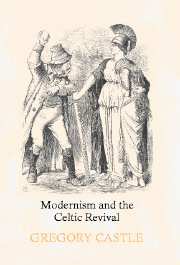Book contents
- Frontmatter
- Contents
- Acknowledgments
- List of abbreviations
- 1 The Celtic muse: anthropology, modernism, and the Celtic Revival
- 2 “Fair equivalents”: Yeats, Revivalism, and the redemption of culture
- 3 “Synge-On-Aran”: The Aran Islands and the subject of Revivalist ethnography
- 4 Staging ethnography: Synge's The Playboy of the Western World
- 5 “A renegade from the ranks”: Joyce's critique of Revivalism in the early fiction
- 6 Joyce's modernism: anthropological fictions in Ulysses
- Conclusion: After the Revival: “Not even Main Street is Safe”
- Notes
- Select bibliography
- Index
4 - Staging ethnography: Synge's The Playboy of the Western World
Published online by Cambridge University Press: 24 November 2009
- Frontmatter
- Contents
- Acknowledgments
- List of abbreviations
- 1 The Celtic muse: anthropology, modernism, and the Celtic Revival
- 2 “Fair equivalents”: Yeats, Revivalism, and the redemption of culture
- 3 “Synge-On-Aran”: The Aran Islands and the subject of Revivalist ethnography
- 4 Staging ethnography: Synge's The Playboy of the Western World
- 5 “A renegade from the ranks”: Joyce's critique of Revivalism in the early fiction
- 6 Joyce's modernism: anthropological fictions in Ulysses
- Conclusion: After the Revival: “Not even Main Street is Safe”
- Notes
- Select bibliography
- Index
Summary
I'll tell you a story – the kings have story-tellers while they are waiting for their dinner – I will tell you a story with a fight in it, a story with a champion in it, and a ship and a queen's son that has his mind set on killing somebody that you and I know.
W. B. YeatsIt is a paradox of the ethnographic imagination of the Revival that Synge's Playboy of the Western World is in some ways a more disciplined attempt to deal with the complex problems of cultural representation than The Aran Islands. This is due largely to the dramatic structure of The Playboy, which leaves Synge little opportunity for the expression of an autobiographical desire. But, in some very important ways, these two texts are linked, for Synge's dramatic development of folklore material in The Playboy constitutes a further performative phase of an ethnographic enterprise that began with The Aran Islands. Moreover, the structure of this continuing enterprise extends beyond the performance of the play to include public reactions to it. By staging his ethnographic fieldwork in The Playboy, often in exorbitantly unrealistic terms, Synge effectively challenges the primitivism on which he had himself relied in The Aran Islands and develops further the contours of an Irish anthropological modernism by calling into question the way tradition typically furthers the aims of the modern artist.
- Type
- Chapter
- Information
- Modernism and the Celtic Revival , pp. 134 - 171Publisher: Cambridge University PressPrint publication year: 2001



